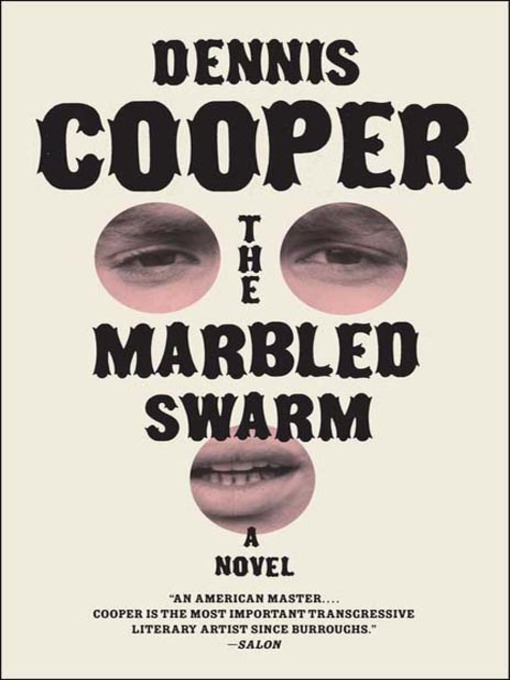
The Marbled Swarm
کتاب های مرتبط
- اطلاعات
- نقد و بررسی
- دیدگاه کاربران
نقد و بررسی

September 19, 2011
Full of peepholes—bodily and architectural—Cooper’s twisting, twisted novel, set in contemporary Parisian lofts and French countryside chateaus, brings to mind the fractured narratives of Alain Robbe-Grillet and the sexual intensity of the Marquis de Sade. The nameless, untrustworthy narrator travels from Paris to northern France to view a villa for sale, which seems above board until the talk turns from real estate to the current owner’s recently deceased son and the narrator’s intense interest in the son that remains, 14-year-old Serge. The narrator dips and weaves in and out of the present as he talks around his designs on Serge, which go beyond rough sex into the entirely unexpected realm of murder and cannibalism. When the narrator recounts the “marbled swarm,” a loquaciously bombastic manner of speaking learned from his father, the act of storytelling itself is called into question. In addition to double-speak and red herrings, the narrator also inherited a penchant for secret passageways, spying, and cruelty. Almost every physical structure has hidden catacombs within, mirroring the narrative layers, the stories within stories. The sex—more often rape—is graphic and Cooper doesn’t always justify the shock.

October 15, 2011
The ever-transgressive novelist attempts a high-toned novel about rape, incest and cannibalism. The narrator of the latest novel by the prolific and profane Cooper (Ugly Man, 2009, etc.) is a wealthy Frenchman who, as the story opens, is purchasing a chateau from a family with some deeply unsettling (if typically Cooper-esque) issues: The owner has been spying on his two sons' sexually abusive relationship, a dysfunction that ultimately leads to one brother being murdered and the narrator abducting the other for culinary purposes. If that all sounds unappealing, there's little in the way of moral resolution going forward. But Cooper isn't simply going for shock value; he wants to investigate the behavioral and linguistic tics that accompany violence and madness. The "marbled swarm" of the title refers to the artful, brocaded language that the narrator's father used—"trains of sticky sentences that round up thoughts as broadly as a vacuum." That doesn't make the catalogue of atrocities much easier to take, but it does clarify Cooper's intentions, and in truth those sticky sentences have a black-humored charm; the reader is drawn into his twisted rationalizations even while he openly confesses he's trying to recruit the reader to support his indefensible behavior. That grows difficult as the story becomes more perversely complicated. The narrator details his half-brother's life among a sullen cult of manga-loving "Flatsos," people who fantasize about being steamrollered flat, and drug abuse abounds, as do homes filled with plenty of metaphorically fraught secret passages. Cooper is careful to calibrate the story's repulsive elements with more philosophical considerations of double lives and the nature of seduction, though the novel doesn't so much resolve as exhaust itself. A button-pushing portrait of sex and rage, told with Sade-esque fervor, but is it futile to ask for more coherence from a madman's laments?
(COPYRIGHT (2011) KIRKUS REVIEWS/NIELSEN BUSINESS MEDIA, INC. ALL RIGHTS RESERVED.)

August 1, 2011
"My marbled swarm is more of an atonal, fussy bleat," explains the narrator. He's not to be trusted in this mystery of dominance, submission, and bizarre allegiances. Author, editor, and playwright Cooper (e.g., the five-novel "George Miles Cycle") continues his literary transgressions with this tale of fathers, sons, and numerous depravities set in Paris and the French countryside. The story starts with a suicide and quickly runs even further amok in a male homosexual "emasculation of reality," told in a style that's a grandiloquent come-on, the unabashed subject matter following the more outre passages of Jean Genet and William S. Burroughs. Early on we're warned, "You'll notice I tell stories in a high-strung, flighty, tonally unstable rant, no sooner flashing you a secret entrance than pretending no such route exists, twittering when there's bad news, and polishing my outbursts." Well, yes. What results is palpable and dizzying, but will the reader make it through the snarky, comma-enjambed passages? VERDICT Decadent readers bored with de Sade's imaginings can use Cooper's book to fill the modern void.--Travis Fristoe, Alachua Cty. Lib. Dist., FL
Copyright 2011 Library Journal, LLC Used with permission.

October 15, 2011
Cooper (Ugly Man: Stories, 2009) tends to engender passionate reader responses, ranging from cultish admiration to horrified blanching to near-incandescent rage. His latest novel, serving up his characteristic transgressiveness that emphasizes disaffected gay youth and casual savagery, may fare no differently. The young, wealthy, debauched narrator careens through the French countryside, contemplating and performing acts filled with sexual rage oddly balanced by ennui better suited to someone many years older. Taking a muted pleasure in violence and the dehumanizing of sometimes-willing victims rules the narrator's movements both in daily activities and carefully controlled inner thoughts. The convoluted sentences that cleverly disguise the stripped-down brutality of the action are the marbled swarm of the title, a manner of speaking the narrator learned from his father, which consists of sticky sentences that round up thoughts as broadly as a vacuum. Readers unfamiliar with transgressive fiction would do well to brace themselves for what will either be the shock of the unrelentingly different or, perhaps, the shock of recognizing writing that speaks to their souls.(Reprinted with permission of Booklist, copyright 2011, American Library Association.)

























دیدگاه کاربران